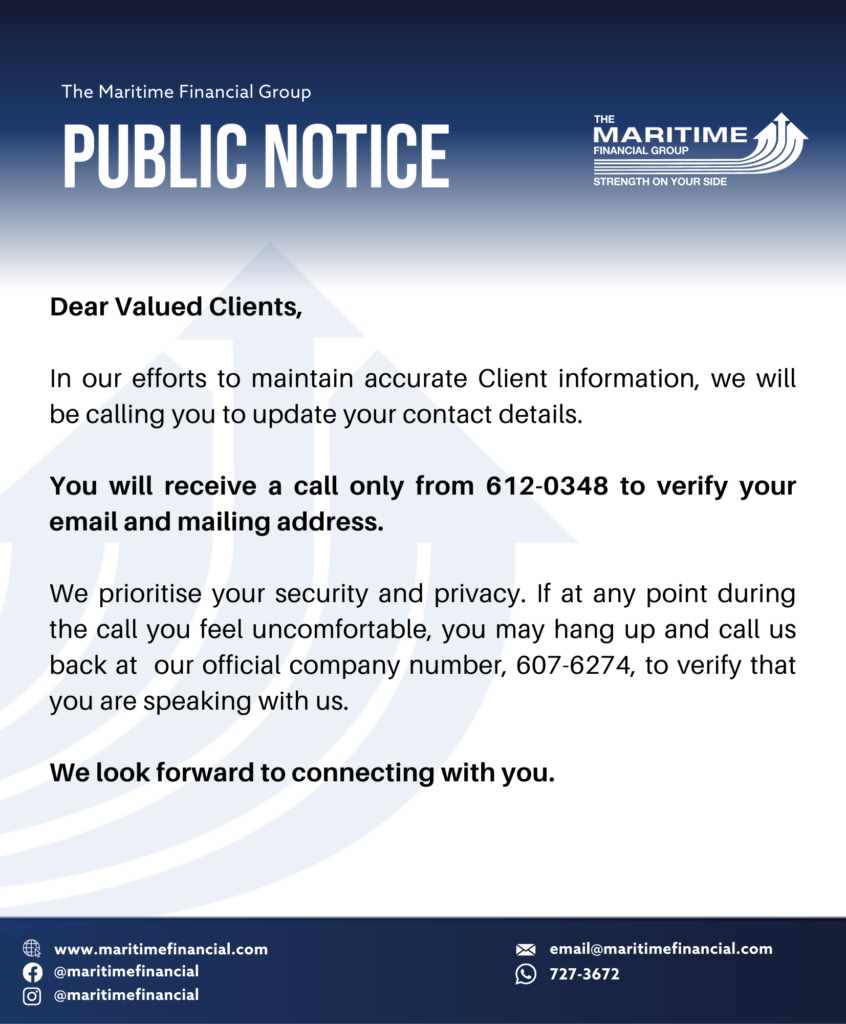
TTAIFA’s Best All Round Unit of the Year 2020
September 29, 2021
The Maritime Financial Group’s Charity Effort Supports Girls in Need Through KIND
October 18, 2021
TTAIFA’s Best All Round Unit of the Year 2020
September 29, 2021
The Maritime Financial Group’s Charity Effort Supports Girls in Need Through KIND
October 18, 2021
Choosing an insurance company – for some people, those four words can cause their brains to switch off. The options in the market can seem overwhelming. You’re not even sure how to tell the insurance companies apart. Maybe it would be easier to pick the company your parents used or the one closest to your house. Well, that might be easier in the short term. But suppose a fire destroys your house. You don’t want to find out – as you try to call your insurance agent for the fifth time, only to hear the phone ring and ring – that you haven’t picked the right company after all.
So here are five tips to help you make the right decision.
Know what you Need
The type of insurance company that’s best for you depends on the type of insurance you need. Let’s take the example of life insurance. We’ve written before about the different types of life insurance: Term Life Insurance and Whole Life Insurance. For Term Life Insurance, you choose your coverage amount and the period of time you need coverage for. This is suitable for people who value flexibility and affordability. Whole Life Insurance is permanent life insurance which includes additional benefits such as an accumulated cash value. This is suitable for people who want to build wealth and establish a permanent life insurance plan. A company that offers the best Whole Life Insurance with sizable benefits may not also offer the most affordable Term Life Insurance. So, make sure you know what you’re looking for in the first place.
Do your Research 
You can start by visiting the company’s website. Some of the things you may want to consider are:
- How long have they been in business?
- What types of products do they sell?
- What are the company’s values?
- Are they involved in the community?
However, an important aspect of research is word of mouth. Talk to people and ask: Who are your insurers? What type of insurance do you have? Have you ever made a claim? What was your experience? If a company’s website looks great, but word on the street is that their customers aren’t the happiest, you may want to consider another company.
Consider Price
Maybe you’re a little financially strapped at the moment. Then, affordability becomes a huge factor. You can compare the costs of different insurance options and use this factor to help your decision making.
But, there is an old saying: you get what you pay for. If you can afford to spend more on insurance, then the cheapest option isn’t always the best. One car insurance option may be more expensive than the other. However, the more expensive option may include increased coverage, which means you will have to pay less if you do experience an accident. And the more expensive option may also include more perks such as 24-hour Accident Assistance and a flat tyre change and repair service.
Consider Customer Service 
You will need to lean on your insurance company at one of the most vulnerable times of your life: maybe you’re sick or your car was totalled or your home was destroyed. At this time, the last thing you need is bad customer service increasing your anxiety and frustration. Consider what kind of attitude an insurance company exhibits in your interactions with them. Do they care about you as an individual and do they seem willing to work with you to meet your specific insurance needs? Are they willing to answer any questions you may have in a clear and patient manner? How easy is it to do business with them? Are there convenient payment options that will suit your needs?
Know that You are Not Alone
We hope that this blog has helped but maybe you still feel a little overwhelmed. Remember that there are also experts available to help you in your decision-making process. You can schedule an appointment with a highly trained financial advisor. This person will have the knowledge and skills to supplement your research and guide you in the right direction.

